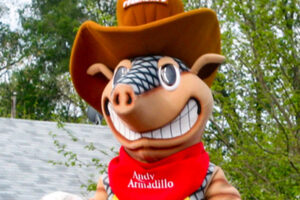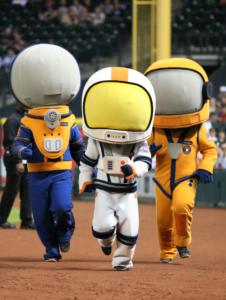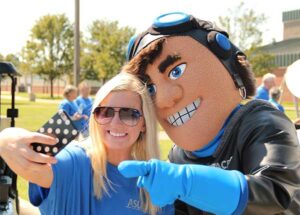If you’re like most people buying a mascot for your organization, you probably have never done this before and are unfamiliar with the process. When creating a custom mascot costume, many components are vital to consider but often get overlooked. To make sure to create your professional mascot in the best way possible for look, form, feel, and function, we’ve outlined the 12 most important things to consider when you buy a mascot.
1. Brand
The main purpose of a brand mascot is simple: to bring your brand to life. Branding is a crucial factor when choosing what colors, materials, and the overall look you want your professional mascot costume to have. You want your mascot to represent your brand well, so it is important to exactly match brand colors when creating your mascot. When purchasing a mascot costume, you often already have a logo or character that you are using as a reference and you don’t want to sway from the look of the pre-existing brand character. A custom mascot company will be able to exactly replicate your existing brand character – making the life-size version just another extension of your brand.
MASCOT TIP:
If branding is extremely important to you, it’s essential to ensure you choose a professional custom mascot costume company that can match your logos, colors, and all other brand requirements.
2. Audience
Understanding your audience and who you’re trying to appeal to is important when going through the mascot design process. If your brand mascot will be attending tradeshows and your target audience is adults, you will most likely want an eye-catching and exciting character that will draw people in, subtly reminding them of your brand. If your mascot is trying to reach people of all ages, such as at sporting events, it might be important for you to have a brand representative that is friendly and easy to interact with. Determining your audience will be vital in choosing how you want your custom mascot to look and function.
3. Mascot Size
Some mascots are strictly used indoors, some outdoors, and some both. If your mascot will be used both outdoor and indoor, the size of the costume becomes important. If you need your costume to fit through an average-sized door, the costume can’t be wider than 36 inches. If your mascot character will be active indoors, you need to make sure that it isn’t too tall that it will hit the ceiling. Don’t forget to consider size in storing your costume as well – if you’re planning on purchasing a large mascot costume, make sure you have the storage space for the costume when not used.
4. Mascot Performer
Fitting your mascot costume on your performer is something you should also consider when buying a mascot costume. The mascot costume should fit the body profile of the performer. Some organizations only have one performer, while others have multiple. If you have a performer who is five feet and another who is six feet tall, the costume will not fit the same and your mascot will end up looking different based on the performer wearing the costume. This situation is not ideal, so it is important to get performers similar in body size to ensure that your mascot will have a consistent look. At this point, it is important to talk about mascot spotters. Spotters escort the mascot where it needs to go, help with crowd control, and make sure the performer is always safe and ready to perform. Having a spotter can help your mascot get dressed, prevent your mascot from falling, and act as the mascot’s voice. If your performer does not have a spotter, the costume design needs to be easy to put on, and the visibility needs to be clear.
MASCOT TIP:
When you buy a mascot, make sure you communicate head, foot, height, and other characteristics about your performer while in the mascot design process to ensure your custom mascot has the best fit for your performer.
5. Mascot Body Suit
The use of your brand mascot directly impacts the decision of the type of body design you will choose for your mascot costume. If your mascot costumes will be used primarily for meet and greets, you won’t want people to feel the performer in the costume, so you’ll want to make sure to add extra padding. If your mascot will be active, doing flips, pushups, or other strenuous activities, you’ll want less padding, allowing the mascot performer to be as agile as possible. When you buy a mascot, it is important to make sure you understand how you will use it and communicate that in the mascot design process.
MASCOT TIP:
Depending on the materials used, the body of your costume can add extra weight to the performer and can be hard to move around in. Make sure to choose a bodysuit that won’t hinder your mascot’s ability to perform.
6. Mascot Head
Different mascot companies will offer different head options. A few of the most common head options are plastic heads and foam heads. Make sure you understand the advantages and disadvantages of each mascot head when in the mascot design process. Plastic heads, while heavier than foam heads, are ideal for ventilation, longevity, and durability. The heads can be cleaned easily after each use and don’t absorb sweat and odor. Foam mascot heads, while lighter, easily absorbs moisture and sweat and can get smelly. In addition, foam disintegrates over time, so your foam head will not last as long as a plastic head will. Multiple types of foam heads exist, so make sure you do your research to understand which option is best for you and your performer. If you aren’t sure what option would be best for your needs, check out our mascot heads blog, or make sure to ask your designer about all the possibilities.
MASCOT TIP:
When designing the head, it is also important to think about the facial features of your custom mascot costume. Make sure to decide whether you want your mascot to be friendly or fierce and communicate that during the mascot design process.
7. Mascot Vision
Visibility is an important aspect of a mascot costume: to perform at its best, a performer needs to be able to see through the costume. A more active mascot will need better visibility and line of sight than a less active mascot. Depending on the custom mascot company that you buy a mascot from, there may be a helmet installed on brackets, so the performer can adjust the helmet for optimal vision through the professional mascot costume. Either way, it’s important to consider the best place for your mascot character’s line of sight. Popular places to add vision to your costume is:
- Within the body of the costume (view an example here)
- Through the mouth (view an example here)
- Through the eye holes (view an example here)
8. Mascot Feet
You don’t want your mascot to be falling over during a performance. Besides the general bulk of a mascot costume, feet size can play a big role in the steadiness of the costume and performer. If you plan to have an active mascot that will be running around all the time or using stairs frequently, you should go with a smaller shoe design. There are a few different options available for mascot feet:
- Slippers: Worn with stockinged feet, these mascot shoes are ideal for meet and greet mascots because they are comfortable and easy to remove and wash (view an example here)
- Footgear: These shoes can be secured with straps to the performer’s stockinged feet or low-profile shoes. These are ideal for active mascots because they will stay attached and allow the performer to walk easily (view an example here)
9. Hands
Determining the purpose of your mascot will help you to decide on the style of hands you’d like for your mascot. If you are going for a cartoonish look, consider using four-finger gloves; however, it will be more difficult to hold objects. If your mascot will need to hold smaller objects or if the mascot will be using their hands quite a bit, a five-finger glove would be a better option. Additionally, any mascot hands can be designed with alternate material to give the mascot performer a better grip.
10. Mascot Ventilation & Cooling Accessories
No matter the climate your mascot will be working in, the costume will be hot to wear. To get some extra air movement in the costume, you should consider adding ventilation. Small areas for ventilation can be hidden by the fur on the costume, and in some cases, fans could also be installed in plastic heads. Cooling accessories, such as cold collars and cooling vests are available to prevent your mascot performer from overheating. On hot days, these accessories can make a huge difference for your mascot performer. Professional mascot costume companies have cooling accessories available for purchase separately or at an additional cost when you buy a mascot.
11. Storage & Shipping
When your brand mascot is not used, you will need to store it properly. If you don’t protect the head and other fragile parts of the costume, it can easily get damaged and will get dirty. Make sure you have a temperature regulated space to store your mascot costume. If you can, it is best to hang up your costume and place the head in an area where the shape won’t get damaged. Some organizations use their mascot at events nationwide. If this is the case for you and your organization, you need to consider how it will get to those locations. Shipping a professional mascot costume can get very expensive, and you need to make sure you have a travel crate that fits the whole costume.
12. Mascot Budget
Each of the aspects listed in this article affects the price of your custom mascot costume. The more detail, special materials, or accessories you add will increase the cost of your mascot. If you’re able to communicate the price range you are working with to your professional mascot costume company from the beginning, they will be able to make recommendations that will help you stay within your set budget.



